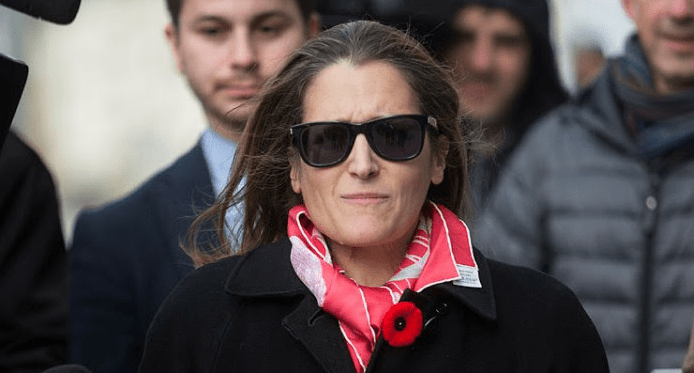Trudeau’s New Normal: The Brazen Sanity of Chrystia Freeland
 Andrew Meade/The Hill Times
Andrew Meade/The Hill Times
Canada’s notably rational new deputy prime minister will need a doctrine of radical normalcy to deal with Donald Trump, Doug Ford et al.
Lisa Van Dusen/For The Hill Times
Nov. 27, 2019
One of the funniest moments during CBC’s live coverage of Justin Trudeau’s cabinet swearing-in on Nov. 20 came from veteran political Svengali David Herle. On the news of Chrystia Freeland’s promotion from foreign affairs to deputy prime minister, Herle reminded anchor Vassy Kapelos that Freeland is not known in Ottawa for her leadership ambitions. In other words, she hasn’t done any of the things associated with stealthy succession campaigns throughout history, from Shakespeare’s wettest coups, to the more clandestine defenestration missions of modern times in major capitals—because, trust him, he would know. From a veteran of the Chrétien-Martin wars, it was a generous bit of perspective and expertise-based public service.
Indeed, the first takeaway from Freeland’s appointment as Trudeau’s lieutenant is that it means he trusts her in a town where trust, for any leader, can be a rare commodity. In political terms, it means he has full confidence in her loyalty. In quality-of-life terms, it means he trusts her not to be creatively visualizing herself on his side of the desk instead of thinking about Doug Ford.
Since Freeland, a Rhodes scholar and mother of three, made the transition from a successful career in international journalism to elected Canadian politics in 2013, she has displayed the sort of trend-bucking rational perspective and sensible prioritization you’d want in a deputy prime minister. As foreign affairs minister, she conveyed a sense of Canada as more than the sum of its vital statistics and with a moral obligation to defend freedom and democracy at a time when they’re under attack around the world, including in, of all places, America. Her perspective seemed to combine the grounding of her background as the daughter of Ukrainian immigrants and the intelligence accrued during her time as a foreign correspondent and senior editor at the Financial Times, and other news organizations.
A worldview informed by years spent assembling the global newspaper that best chronicles the impact of economics on every aspect of life, including politics and geopolitics, could not have hurt the NAFTA 2.0 negotiations. And being a woman who’d successfully navigated, as an editor, the ego Whac-a-Mole of upper Fleet Street likely made Donald Trump’s tweets easier to deal with.
Above all, Freeland showed principle at a time when principle is viewed, in certain circles, as an unforced error. On the current challenges of Canada-U.S. relations, on China’s leveraging of trade to inhibit and punish criticism of its increasingly Orwellian human rights abuses and authoritarian expansionism, Freeland has been the voice of normalcy, reason, and basic decency.
These days, that kind of brazen sanity can make you a target for the sort of criticism and intimidation that gets triangulated on social media and delivered by proxies. In Freeland’s case, it has tended to come wrapped in that oleaginous appeasement of bullies that portrays standing up for human rights and democracy as naïve. As though Brian Mulroney was naïve when he stood up to Margaret Thatcher on freeing Nelson Mandela and ending apartheid. Or Jean Chrétien was naïve when he stood up to Dick Cheney in opposing a fraudulently justified invasion of Iraq.
It has likely helped Freeland that she’s been underestimated. As a woman jumping into Canadian politics after years abroad, she wasn’t subjected to either the expectations or vilification that sank Michael Ignatieff a decade ago. But it’s an advantage harder to maintain when you’re the most powerful woman in the country.
And handling Trump and Jason Kenney—who’ve both exhibited an affinity for the more preposterous aspects of narrative warfare—at the same time could require that she dust off the expanded political imagination she surely acquired covering Putin’s Russia. It may come in handy.
Lisa Van Dusen is associate editor of Policy Magazine and a columnist for The Hill Times. She was Washington bureau chief for Sun Media, international writer for Peter Jennings at ABC News, and an editor at AP in New York and UPI in Washington.
